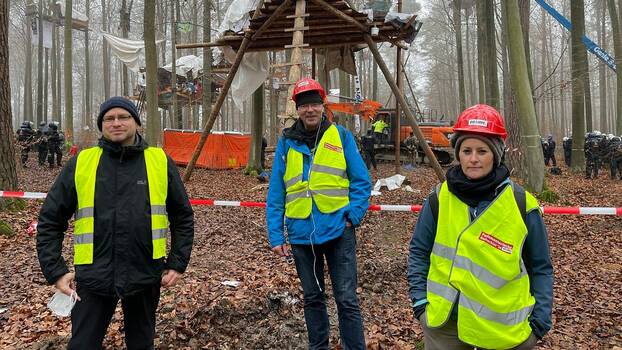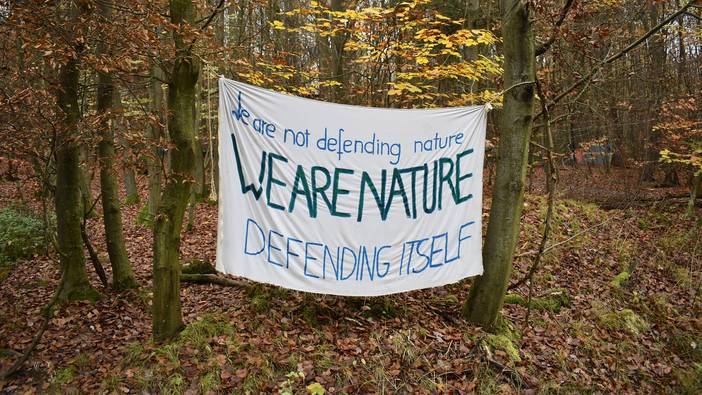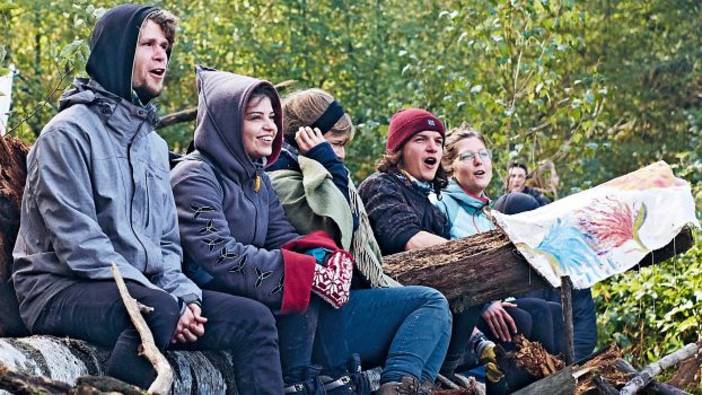
The fight over the Dannenröder forest is about more than failed transport policy, says Torsten Felstehausen, chief whip for Die Linke in the Hesse state parliament.
Torsten Felstehausen is chief whip for Die Linke in the Hesse state parliament. As a parliamentary observer, he is closely following the protests against the construction of a motorway in the Dannenröder forest (nicknamed “Danni” in German) and as environmental spokesperson of the parliamentary party in Hesse is fighting for its preservation.
The dispute in the Dannenröder forest concerns a relatively short additional stretch of the Autobahn, or motorway. Why are these few kilometres so crucial?
TF: The resistance to the expansion of the motorway is about making clear how deeply misguided transport policy is all over Germany. The federal transport routes plan envisages the construction of hundreds more kilometres of motorway in the next few years. In Hesse alone, over €1 billion is being spent on the construction of roads in 2020. The Dannenröder forest is a symbol against this sort of politics. We are in the midst of a global climate crisis. To plow a new highway through an intact forest at a moment like this simply makes no sense.
At this stage, are there any remaining legal options for halting the planned construction of the motorway?
Legally speaking, all avenues of appeal have been exhausted. We now have a written judgment from the Federal Administrative Court which says that the assessment of the project’s compatibility with the European Water Framework Directive, which failed to take place, cannot now be demanded in retrospect. The judgment does also go on to say that numerous areas of environmental protection law—particularly the way the Water Framework Directive was dealt with—were not taken sufficiently into account during the planning approval stage, and that if the expansion project were up for approval now, it wouldn’t go through in its current form. The planning process, mind you, began 40 years ago, and the decision to approve the plan was made twelve years ago. Legally, there’s nothing left to be done…
A broad and diverse coalition of groups and individuals is active in preserving the Dannenröder forest and advocating for modern transportation policy. A selection:
Aktionsbündnis Keine A49!
Aktionsgemeinschaft Schutz des Ohmtals e.V.
Wald statt Asphalt – Der Blog der Waldbesetzung
Schutzgemeinschaft Gleental e.V.
BUND Vogelsbergkreis
NABU Homberg/Ohm
Robin Wood
Greenpeace
BUND
Campact
Ende Gelände
Politically, however, there are still options…
That’s right. It’s a question of political will, whether the CDU–Greens coalition that currently governs in Hesse is prepared to re-think the project. Forty years ago the world looked different; but today we’re aware of the global climate crisis. And we have to respond to that, no matter what the legal assessment has been.
What would have to happen at the state level to prevent the expansion from going ahead?
Up until this point Tarek Al-Wazir (Hesse’s deputy minister president and co-chair of the state’s Green Party) has taken the position that his hands are tied—and has shifted responsibility onto the Federal Transport Ministry. But that doesn’t mean that there’s nothing that the Hessian state government can do. The Hessian minister for the interior is responsible for the deploying of state police against demonstrators, for example, and the Hessian transport minister, who is from the Greens, was the one to sign the contract with DEGES (Deutsche Einheit Fernstraßenplanungs- und -bau GmbH). Either of them could halt the tree-clearing. Doing so would be entirely reasonable, and would provide time for a de-escalation of the situation.
But the Hessian state government is acting as project manager for the construction of the road on behalf of the federal government…
Yes, that’s right. But the federal government hasn’t given the Hessian government any specific directives regarding the project. In fact, there has never been any such directive in all of the history of the German federal republic. So one could wait and see if any such instructions were actually forthcoming. The issue would receive a different level of attention at the federal level and the discussion would be carried on in a much broader fashion. We don’t have to treat the right to build a road as a duty to do so!
That means that the Hessian Greens could definitely re-open the case on this. Why don’t they?
The construction of the motorway is a key component of the coalition agreement between the Greens and the CDU. The one remaining back door was the judgment of the Federal Administrative Court, which we now have. A right to build has been established. Perhaps the parochialism of the Hessian Greens has to do with the fact that the state government coalition only has a one-seat majority. However the growing pressure currently being placed on the Greens by climate activists, NGOs, and civil society has simply put the Greens’ nerves on edge; there is no level at which a sensible discussion is taking place. It seems to me that the Greens want to close the book on this as quickly as possible, regardless of what happens.
Under what circumstances might an ambitious transport policy—one that would actually be part of a larger systematic transformation—be at all conceivable?
Let me preface this by saying that I can completely understand the perspective of people who live near federal highways when they say, “I can’t stand the strain of being exposed to this level of traffic any longer, with columns of trucks winding their way through our townships day and night.” The question is: are new roads the solution?
What we need is a different approach to the economy and regional development. When Berlin cucumbers are taken to Portugal and packed into jars there, only to have the jars later labelled in Poland, then we have a clear example of a completely failed economic policy that generates an ever-rising traffic load. As things stand, businesses are always finding places where working conditions are even worse and wages even more depressed than in their current location. That’s where we need to start. We need to develop an economy that focuses on regionalization and strengthening businesses in their local context, not on wage-dumping and the evasion of labour law standards.
According to a study carried out by the Wuppertal Institute, we have to halve the number of cars on the roads by 2035 if we want to keep to the goals set by the Paris Agreement. In order to do so we also need significant resources for the expansion of local public transport and an entirely different pricing policy that moves in the direction of ticketless mobility. And of course in the countryside we need facilities that are serviced by public transport so that people don’t buy cars in the first place.
… a very complex topic…
Yes, because we have to tackle the changes that rural areas have experienced over the past few decades. If you live in such an area and you want to go to the chemist, you can no longer simply head into town, you now have to travel to the nearest larger urban centre. It’s the same when it comes to doctors, midwives, grocery stores… If the provision of necessary services is no longer guaranteed locally, then of course I have to travel. And there’s more. We also find ourselves confronted with a dispatch economy that’s running rampant; everything is ordered off Amazon. That leads to ever more expansive logistics operations, new roads, and new motorways…
Is it time for restrictions on advertising—as a means of taking the pressure off the roads?
Yes. Even just looking at Black Friday, which at this point has already become an entire week or even several weeks. The exclusive aim of such campaigns is to produce as much consumption as possible. Every day, and via every medium, we’re surrounded by attempts to incentivize consumption and entice us to buy as many products as possible. Our mailboxes overflow with junk mail. Is this what a sustainable society looks like? Do we really always need the latest smartphone? Are we only able to wear t-shirts for one season? We have to think about how consumption habits emerge and what actually leads us to desire more and more. We need a population that is more resilient against the promise of advertising, one less driven to identify with statements such as “I feel good when I buy something.” That, too, is a precondition for there ever being a structurally different transport policy.
A struggle over an Autobahn
The A49 is far from a sure thing and never has been, with the project being met with resistance from the very start. The idea for the road has been around since the 1960s. At that time, federal transport minister Georg Leber (SPD) argued that no one in Germany should have to drive more than 20 km to reach the nearest motorway. The plans became more concrete in the 1980s—which is when resistance to the plan became more visible as well. The controversial section—meant to extend the already existing northern part of the A49—is around 37 km long. It is intended to connect Kassel with central Hesse and debouch into the A5 at the Ohmtal junction (map). Among other obstructions in its planned path is the Dannenröder forest, a 250-year-old mixed deciduous forest. Eighty-five hectares are to be felled to make way for the extension. In addition, 25 hectares of habitat for flora and fauna (a so-called “Natura 2000” area) at Stadtallendorf and the protected drinking-water catchment Greental will also be affected. Local civil society initiatives have complained that alternative solutions designed to reduce traffic on the bypass roads and extensions to the railway network have been neglected or outright ignored for decades. Since autumn 2019 areas of forest around 20 km east of Marburg have been occupied by activists, thus becoming the scene for a confrontation over climate justice and environmental protection. In June 2020 the Federal Administrative Court rejected a request submitted by BUND that the European Water Framework Directive be upheld. With the judgment of the Federal Administrative Court, the existence of a legal right to build the road has been established. Since October 2020 the CDU–Greens state government in Hesse has tasked police with evicting the occupation from the forest.
What are the chances that the conflict over the Dannenröder forest will spur discussions about this?
A lot has happened already. “Danni” has seen a form of resistance develop that is directly engaged with these issues and radiates outwards in a powerful way. Many from the more bourgeois sections of the resistance to the expansion have been frequently heading into the forest and demonstrating solidarity with those who are occupying the trees there. In this way they’ve come into contact with these issues—with the question of avoiding excess consumption, with the question of what a society truly centred around solidarity would have to look like. And yes, voices from the region saying we not only have to raise the issue of the motorway, but also of the system itself—these voices are becoming significantly louder. That is, not continually preaching individual asceticism, but looking behind the façade and asking: what leads us to act in the ways that we currently do?
Thinking in terms of the movement’s strategy: what needs to be done now to step up the conflict?
What we really mustn’t say at this point is that this fight has been lost. An incredibly important signal has been generated, and an incredible amount has been achieved. I hope that this is the last motorway project to eat up a section of forest in this way. When you’re on the ground here, it’s clear that it no longer makes any sense for things like this to happen. And that’s down to what the activists have achieved. Even if Danni is successfully evicted, it will become all the more important that afterwards the people who have been active in resistance efforts find structures available in which they can deal with these experiences, which have at certain points been traumatic. And of course after that there will have to be further networking, which requires that there be people in the movements and in Die Linke whom people can get in touch with, who can take up that work and carry on a discussion together about how to build a world based around solidarity and climate justice, and the structures and conditions such a world would require.
Because it’s abundantly clear that all of this goes well beyond Danni and the struggle over the forest. When I see how many movements there are that have now sprung up in opposition to soil sealing, to new logistics precincts, to motorways, to mines—then the overarching aim must be to bring the ideas and criticisms that lie behind these movements into a mainstream discussion. It’s not enough just to place a ban on building new motorways. It’s not enough to shift how we do transportation. We need to start a complete reconstruction of every area of society. And we have to do it now. That’s the crucial thing. It’s not enough to have climate goals for 2035 and to somehow bluff our way through until then; climate transformation has to begin NOW and we have to be resolute about implementing it.


